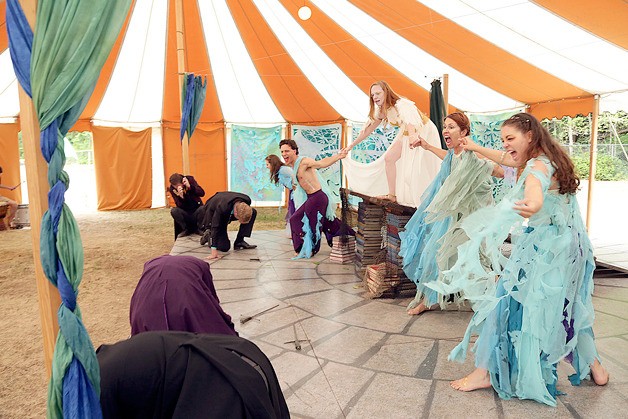Island Shakespeare Festival’s two 2015 productions are two sides to the same coin of humanity.
One side has the females of “The Tempest,” which opened this weekend; the other, “The Three Musketeers,” represents the male. They play on the themes of honor and power crafted by artistic director and founder Rose Woods, who is directing “The Tempest.”
Gordon Carpenter is directing “The Three Musketeers” based on his own adaptation of Alexandre Dumas’ French tale of the men protecting the crown. With Musketeers, Island Shakespeare Festival is taking its first foray away from the works of Shakespeare since launching in 2009. Woods said she chose to include a non-Shakespearean work to the lineup this season because she wanted to vary what was offered and because she trusted Carpenter to create a great work, for which he was commissioned. Originally, a third production of “Night of the Iguana” was set to be part of the festival but was dropped due to personnel changes, Woods said. With further plans for a third production in 2016 and perhaps a fourth in later years, Woods said the festival will rely only on classical literature for performances.
“I love that in classical literature chivalry still exists, that good guys are good guys and villains are villains but sometimes do good,” she said.
In Tempest, a magician and duchess named Prospero, played by Amy Wheeler of Hedgebrook Institute, is stranded on an island with her daughter, Miranda, played by Katrina Christiansen. Due to the machinations of Prospero’s brother, Antonio, she and her daughter were stuck on the island. That is, until Prospero divines that Antonio, played by Andy Fling, is offshore and summons a tempest — thus the title — to bring her brother ashore to get revenge and restore her and her daughter’s place as the rightful ruler and heir.
Woods said it is a story of the lengths to which parents will go to ensure their children’s safety, or of anyone’s attempts to help those they love.
Rather than seeing Prospero’s storm as a solely destructive force, Woods said it allows all of the characters to undergo a transformation.
Woods said the story, as she has adapted it, is intensely personal. She first moved to the area to spend time with her mother, and that relationship was the springboard and connection to the story and characters of “The Tempest,” particularly Prospero and Miranda.
“ ‘The Tempest,’ for me, is all about redemption,” she said.
In her director’s message about the production, she wrote: “I am rediscovering grace, hope, and no small amount of love. It’s humbling.”
She saw the relationship between Prospero, traditionally a much older male, and the 15-year-old Miranda as needing more realism. Lowering the age of Prospero and making the duke into a duchess changes it drastically, she said, and the actors have brought a genuine element to their onstage relationship.
Woods said there are lines where Miranda, as played by Christiansen, has the snark of a 15-year-old girl responding to her seemingly overbearing parent.
Playing with the gender of characters and of the performers is nothing new, and continues a long tradition in acting. Woods said it matters more about how an actor connects to the character more than just having men play men and women play women, unless it defeats the purpose of the play entirely.
A bit of cross-gender performing will take place with “The Three Musketeers” as well. With 11 women and eight men performing in the company, by necessity some of the swashbucklers will be female.
All three main musketeers, however, are men, as played by Aramis’ Gavin Douglas, D’Artagnan’s Michael Robinson and Porthos’ Damien Cortez.
Woods described “Musketeers” as being “testosterone-driven,” because of all of the action and fights.
“There’s 20 fights in ‘The Three Musketeers’ at least,” she said. “It’s a melee.”
To create a different experience, the tent will utilize its new field at South Whidbey Academy. By opening up the back flap and moving backstage to the corners, during fights, the action on stage will be supplemented with background fights on the grass, creating a more layered visual.
In director Gordon Carpenter’s director’s notes about “The Three Musketeers,” he wrote that his fascination with the story began after seeing the film by Richard Lester and screenwriter George MacDonald Fraser in 1973.
“And it was a time when you were able to sit through as many showings as you liked after buying your ticket,” he wrote. “I sat through it over and over again.”



